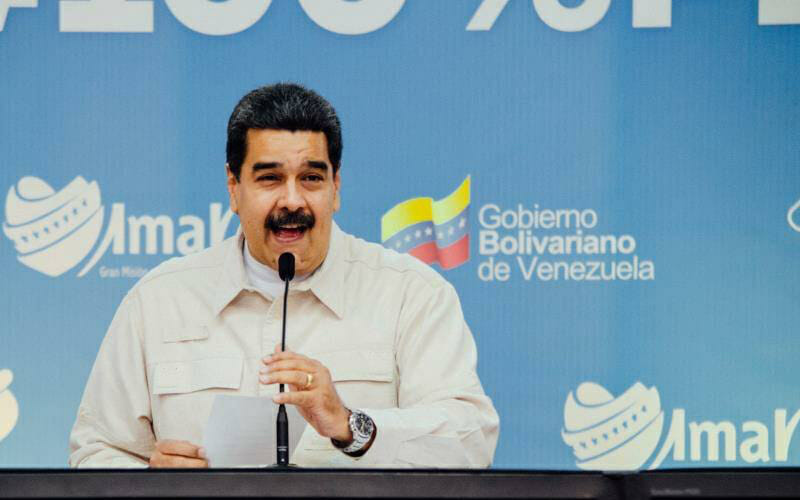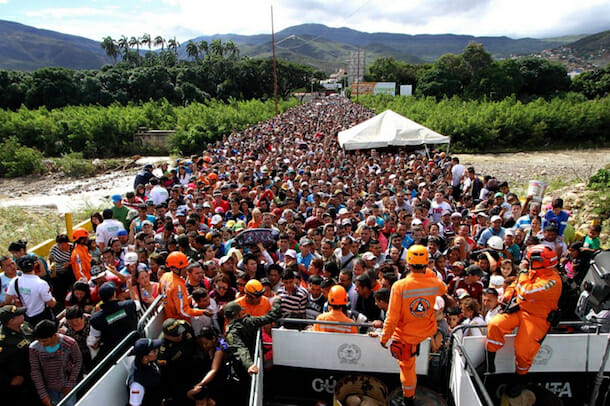
On Negligence and Historical Solidarity: Venezuelan Refugees in Colombia
Among the hundreds of thousands people that emigrated from Colombia to Venezuela between 1963 and 1973, was my grandmother. She, like many other Colombian parents, had to leave her children behind (my oldest aunt being 13), due to the socio-economic environment that afflicted Colombia during that time and that disproportionately affected the impoverished populations. According to figures cited by politicians of the time, between the 80s and the 90s, five million people in Venezuela were of Colombian origin.
Fast forward to 2018, the highest historical influx of Venezuelans to Colombia is already being called a refugee crisis. The absence of an appropriate strategy to deal with this issue is already leading to xenophobic attitudes and opportunist political campaigns for the upcoming presidential elections. Several political groups in Colombia have capitalized from Venezuelans’ suffering to promote their agendas, making it clear that they do not even have coherent proposals to offer.
Some of the main reasons of the massive Colombian emigration that started during the late 1960s to Venezuela and other countries like Ecuador, Panama, Peru and the United States, were the scarcity of job opportunities and the high levels of poverty. Another major factor was the internal conflict that was continually gaining strength, especially in rural areas in Colombia.
The end of “La Violencia” was only opening the door to more than 50 years of internal conflict between the state, guerrilla groups and paramilitary forces (often sponsored by the state in conjunction with U.S. forces), leaving “collateral damage” wherever you looked. Venezuela, as well as Ecuador, were thus prime destinations for Colombians looking for stability and peace due to their then favorable economic situation. But there is also an old historical component that adds to the importance of these two countries in the context of migration from Colombia, and it is their common historical past, rooted in the “Bolivarian Unity” ideal that led them to, for a little while, be one united republic.
Now, the coin is flipped. Hundreds of thousands of Venezuelans have left or tried to leave the country for other South American countries in the last 4 years. For instance, last year 31.667 Argentinian residences were given to Venezuelan citizens, which represents a total increase of 142% compared to 2016. It is with no surprise that the highest Venezuela emigration is towards Colombia, with the UNHCR reporting that as of July of 2017, there were approximately 300,000 Venezuelans living in Colombia, who had fled escaping the economic crisis marked by hyperinflation and shortages of basic goods, including food and medicine.
Now, the reasons behind the economic and humanitarian crisis have different versions: most international media outlets and politicians argue that the concerning situation is a product of an extremely weak state power and the “castro-chavismo” that has reigned in Venezuela, along with Maduro’s refusal to openly receive humanitarian aid. On the other hand, while Maduro and his supporters state that the U.S. sanctions are what have aggravated the economic situation and that the media is portraying the current Venezuelan state in an exaggerated manner to justify possible intervention in the country. Whichever the explanation is, the fact is that the Venezuelan refugee issue is serious.

Colombia and Brazil have begun to tighten border controls. Colombian President Juan Manuel Santos has already asked international help to cope with what he calls a humanitarian crisis, prompted by the mass and continuous arrival of Venezuelans. In some regions of the country, the demand for education has increased by 100% and the demand in health care is unsustainable as only taking into account maternity, it is estimated that five babies from Venezuelan mothers are born every day in Colombia. What is more discouraging is that Colombia, Brazil and several other South American countries, who constantly look for guidance from the international community or the world powers, countries who they deemed “more developed,” do not have any sustainable role models to follow.
The lack of a comprehensive immigration policy in the United States, the refugee crisis in Europe and the attitudes towards migrants and refugees in those areas provide nothing but proof that there are no governments or organizations adequately equipped to deal with refugee crises or the need for serious immigration reform. Way too often, the only response that government officials seem to find is to promote a discourse against refugees, many times equating them with terrorists or the source of many national issues that have been present long before mass immigration even started.
Meanwhile, on the streets of Bogota you can find billboards that read “Vote for (Centro Democrático) so that Colombia does not turn into another Venezuela.” Such sensationalist political propaganda tries to serve as a substitute of serious proposals, and uses another nation’s hardship to justify very conservative candidates and policies. However, such strategies are not only employed by Centro Democrático (former president Alvaro Uribe’s political party), but also by candidates for the upcoming presidential elections. Marta Lucía Ramírez, Iván Duque, Germán Vargas Lleras and Alejandro Ordóñez, to name a few, who have mentioned the Venezuelan crisis as the only possible outcome that would be realized if Colombians do not vote for them.
As it often happens, hope has come in the hands of a lot of concerned Colombian citizens who have been able to provide donations and shelter to thousands of Venezuelan refugees. When asked, many people say that Colombians cannot forget what Venezuela and Venezuelans “did for us when we were the ones fleeing to their country.” However, it is clear that these efforts are not totally sustainable and that what really matters are the measures that will be taken at the governmental level, with the help of the international community.
My grandmother, now in Bucaramanga, still retains her Venezuelan accent, product of having lived for more than 35 years in the neighboring country, a country that allowed her to send money back home to feed and educate my three aunts and my father. At this point it is almost naïve to hope for the same outcome for all the Venezuelan parents now in Colombia. And that’s not fair.

